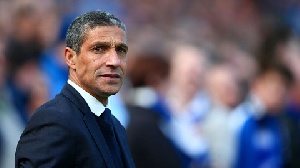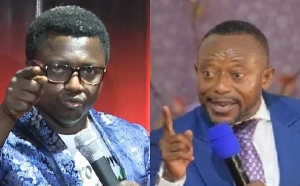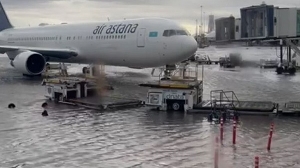Opinions of Saturday, 17 December 2011
Columnist: Sakyi, Kwesi Atta
Down Memory Lane Part 2
– Schooling In The 50s, 60s And 70s
BY KWESI ATTA SAKYI
11TH DECEMBER 2011
Growing up in the then Gold Coast, later Ghana, was quite an interesting experience. I remember that when I was about 5 years old, we used to listen to sweet highlife tunes such as Beento, Jaguar, Papa Kwesi Ma Me Aben, paah paah, paah. What with E.T. Mensah and his cross-cultural exchanges across the English-speaking colonies in West Africa. We also listened to some Nigerian music such as Tunde Nightingale and quite later in the 60s, Victor Qwaifo’s (You go see Maame Water oh}. Then came Kaakaiku, E.K. Nyame and Kwabena Okai, Kwabena Onyina (Beye den na wonko, ohia soma wo) and Bob Cole’s Amaafo Ede, aka me kapeaba womfa ma me. Then Kofi Ani Johnson of the Police Band swept us off our feet in the 70s with the hit song, Madamfo pa beko agya me na maye no-sen ni. Oh, that was tuneful and cheerful. We had the Queen visiting in 1961 and the hit highlifes then were Buronyi woewu eei, Meye den na mehu me deya (dear), odo bra, ‘Wofa no no, oto ontua ka eei aye eei. I attended teacher training at Komenda in 1966. We used to have Saturday entertainment of record dances, and on holidays in Winneba, the jamming places were Copa Cabana Junction, Revolutionary Square at the then ATTC (formerly Kwame Nkrumah Ideological Institute), now University of Education, Winneba and People’s Motel near the Catholic Church. The good old days saw us wearing afro hair, (James Brown style), hipster trousers with flared or bell-bottom and slim fit skirts with large collars or labels. Guys walked as if they were walking gingerly on air or cloud 9 or like Okwonkwo in Chinua Achebe’s Things Fall Apart. Before then, we had had the tunabu or skin tight or plain face trousers with very slim legs and double back pockets. It was a tug of war for drunkards to full off those trousers. Before then, we had had garbadine and ropopo (obey the wind). There was a high life tune about it, ‘Se enye me beye dza, ono aye a hye atar pa, na nea ewuo dee mempe, nee ewuo oo, aya nea ewu dee mempe’. We had the Ramblers, Uhuru, Blackbeats, Broadway, Cooler Lobitos, Wulomei, Sky Hawks, Pozo Hayes, Pat Thomas, Mathew Chapter 5, Hedzoleh Sounds, SweetTalks, Kofi Bruce, Ampadu and other bands. In 1962, the imbroglio in the Congo was at its apogee and we used to see hundreds of planes of different hues flying over to and from the Congo. We used to have a radio programme on GBC, whereby Ghanaian soldiers and policemen who were sent to the Congo spoke to their families from Congo and greeted them. The Ghana Army Band used to play a signature tune, ‘Congo, Congo, River Congo Oh……..’ Oh, boy! The world then seemed to be coming to an end. We used to listen to radio broadcasts mounted by Nkrumah and translations in various Ghanaian languages. Of course, on hindsight, there was a lot of propaganda in it as Nkrumah was embroiled deeply in the Cold War on the eastern side, with scathing remarks against western allies and their lackeys in Africa. We used to hear Nkrumah vehemently denouncing names of international diplomats such as Ralph Bunche and the British Overseas Minister, Duncan Sandys, Adlai Stevenson, and U Thant. Ghana used to receive a host of august foreign dignitaries such as Mikoyan of the former USSR, Bronz Tito, Suharto, Gamel Abdul Nasser, Modibo Keita, Sekou Toure. In 1965, when Ian Smith declared Southern Rhodesia independent, (Unilateral Declaration of Independence – UDI), Nkrumah was incensed and called on the then OAU to form the African High Command (AHC) to intervene. He appointed one diplomat, Dei Annang as ambassador extraordinary and plenipotentiary. In the Congo crisis, names which kept being brandished around in the news were the players, particularly in Katanga Province, such as Kasavubu, Cyril Adoula, Moise Tshombe, Mobutu Sese Seko, Patrice Lumumba, Joseph Okito and Maurice Mpolo. One brave soldier who came back from Congo was living near my mother’s house in Winneba and he went totally mad till he died. He was very gentle to everyone and somewhat sane but perhaps, past atrocities had turned his mind upside down. He told a story of being among the Ghanaian contingent in Kamina area or in the Kolwezi area near the large Kasai River that saw red in the Congo. They were ambushed at dawn by enemy forces, and driven to the large river. Those were the days of the pro-Belgian mercenaries and gendarmarie like Jack Schramme. Being a man from the coast, he survived by swimming to his freedom, despite a heavy loss sustained by his company. He said he took his toll on the enemies. Those were the days we had distinguished soldiers like Major Anthony, Lt Gen Ankrah, Gen Akwasi Amankwaa Afrifa, Air Vice Marshal Otu, Admiral Hanson, Brigadier Kattah and Brig Bawa among many other stalwarts. Before Nkrumah delivered his speech on radio (sometimes dawn broadcasts), it would be preceded by patriotic songs such as, ‘Odasani eei, obi ye bi ma wo a ye bi ma no oh, odasani ,odasani… Okyeame Akuffo would chant very rich Akwapim appellations, followed by royal trumpets (mmensuon) and royal drumming. Then Osagyefo would begin his speech. (He was like a Hitler or Cicero or Kruschev or Mark Anthony or Fidel Castro) when it came to fiery speeches spiced with emotions and gestures. He was like Nikita Kruschev in his speech mannerisms. Well, let us divert from the big geopolitics of the time and talk about football. I never became partisan at school as I only supported the national teams, the Real Republicans (de facto Black Stars), Academicals, and Black Stars. In those days in the 60s and 70s, the rivalry between Ghana and Nigeria was very keen. The Nigerians used to have a terror called Onyawuna. Later they had ‘Mathemtical’ Odegbami. Ghana’s Black Stars, with Nkrumah as patron and under the able and adroit directorship of Ohene Djan, was a veritable showpiece. In goal were the likes of Kwaw Baffoe, Addoquaye Laryea, Dodoo Ankrah, Robberman Naawu and in the 70s, the late superman, Robert Mensah whose tragic death occurred in 1971 through death by bottle stabbing in Tema by one Melfah (Telfah). That was before a crucial match between Kotoko and Ebusua Dwarfs.
In defence, we had Crentsil, Oblitey, Addo Odamtey and Dogo Moro. The sharp shooters were the likes of C.K. Gyamfi, Kwame Adarkwa, Ben Simmons, Agyeman Gyau, Ofei Dodoo, Salisu, Edward Acquah, Aggrey Fynn, Osei Kofi, Mfum, Opoku Nti, Lawal, Kwane Nti, Lutterodt, Tim Darbah, Sunday Ibrahim, Malik Jabir, Modibo Toe, Baba Yara, Gibrine, Aikins. I remember world class football teams which visited Ghana before 1966 included Vasco Da Gama, Real Madrid and Flamingo teams, the former and latter from South America. Some of the then famous players who came along included Garrincha, Puskas and de Stefano. There was also Sir Stanley Mathtews of Britain who visited in those good old days. In boxing, we had legends like Roy Ankrah, Joe Tetteh, Oblitey Commey, Sulley Shittu, Edie Blay, Floyd Robertson, Surpriser Sowah and Sugar Ray Akwei. There was the Takoradi local heavyweight terror, Ekow Kranie. In athletics, we had the Flying Queen, Alice Anum, the galloping soldier, Mike Ahey. In high jump, we had late Lt Col Robert Kotei. In table tennis, we had Ethel Jacks, Okine Quaye, S.K. Allottey, E.N. Mullings, S.B. Laing, Esther Lamptey, the Sowah brothers and the doyen of table tennis in Ghana, the benefactor and businessman, D.G. Hathiramani. In athletics again we had M Addy. Cycling produced Mike Adjavon. The famous football referee I remember is Wontumi. We had the Rome Olympics in 1960, Tokyo in 1964, Mexico in 1968, Munich in 1972, _____, 1976 and Moscow in 1980. Since TV came around 1965, we used to listen to radio commentators. We had the veteran and incredible Joe Lartey, whose descriptive adjectives more than gave you vivid images of proceedings on the field of play. There was also Ackah Ayensu. At GBC were seasoned newsreaders whose diction, elocution and pronunciation equally matched those at BBC. Here, I am talking about people like John Hammond, Kwame Amamoo, Vincent Assiseh, Ghartey Tagoe, Robert Owusu, Vida Koranteng Asante. Later, we had some of my contemporaries from Komenda College at GBC, including Kwamina Quagraine, Rev Ato Browne, G.C. Sam and Annan Forson from Adjumako Training College. From Winneba, came my maternal cousins, Amamoo Kaakrah and Amamoo Panyin, whom I have never seen or met but knew their late mother, Maame Onwensimah. There was the Fante maestro, Kojo Halm (late), whose children were my contemporaries at school and at the Methodist Church, Winneba. There was Ama Sasarko, another relative on my father side from the Ayirebi Acquah and Quaison Sackey families. For Twi, we had Akwasi Donkor (foremost linguist) with his, ‘Entrée oh, entrée pa.’ In journalism, we had the famous Carl Mutt or Henry Ofori in the Daily Graphic(Kontopiaat), Cameroon Duodu, Elizabeth Ohene, Larweh Therson Cofie, Kissiedu, Ben Ephson, Kofi Badu, Kofi Batsa, Ben Akumanyi, Dr Paul Ansah (late) and others, writing quality articles in magazines and respectable journals such as Legon Observer, West Africa Magazine and Insight Magazine, all of which I read avidly and profusely as a young man. Some Ghanaians in the diaspora hoisted high Ghana’s flag at the mega media houses. At BBC, we had and have people like Ben Dotse Malor, Kwabena Mensah, Ofeibea Quist Arcton, Kwaku Sakyi Addo, Ama Annan, Kobla Dumor, Vick Kwakufi, Elizabeth Ohene, among others..
Baffour Ankomah, Cameron Duodu are still with the vintage New African Magazinein London. At VOA, we had Richard Kotei (late) and at Radio Netherlands, we had John Hammond. Currently at BBC, we have Akwasi Sarpong, Vida Kwakufi, Kobla Dumor, Ibrahim Sani, David Amanor and Ebow Godwin. When I was growing up, I used to listen to daily radio broadcasts, especially Everyday English and lessons in French. Since I did not attend secondary school, unfortunately what I picked from those broadcasts in the early 60s are the few French vocabs I know. Better than nothing, not so? Bien entendu! What about studies in those days? We did a lot of self tuition, even though we had excellent teachers. We learnt many things on our own. For example, I studied arithmetic and geometric series on my own and mastered a bit of calculus from reading a Jehovah’s Witness magazine! So, before going to university to read Economics and Statistics, I had mastered the basics of integration. At Komenda, my seniors used their allowances to register for correspondence courses with RRC (Rapid Results College) and Wolsley Hall in the UK. Unfortunately for us, when we got to the second year of our 4 year course at the teacher training college, the NRC (National Redemption Council) soldiers cancelled our allowances so we could not undertake correspondence courses. Yet we steeled ourselves that by hook or crook we would read like mad to pass our O and A levels and we did. I still remember in the 50s how I used to enjoy looking at glossy pictures captured in National Geographic Magazines which my illiterate father kept at home and I think that whetted my appetite in Geography and reading in general. We used to look at glossy catalogues of shoes (Clarks) and clothing which our predecessors used to order from the UK. Cigarettes in those days were Tusker, Townhall, Sweet Menthol, Consulate, Benson and Hedges and Durbar. For alcohol, I remember Bramsco, from Nsawam Cannery, Lawyer, Guinness, Scheidam Aromatic Schnapps and Lions Gin. Our matches (lighter) were the three pot brand from Jonkoping in Sweden. We students in upper primary wrote with stick pens with nibs and we carried ink pots or bottles. Some popular ink brands were Lions, Quink and Watermans. We had watercolour pads and brushes for art while lower primary pupils used crayons and 2B lead pencils. In 1963, Kwame Nkrumah introduced free supply of books and instructional material in all schools in Ghana. Had it not been so, I would have dropped out of school because it was a make or break year for me as my father was on meagre, pension grub money. I remember how Winneba was bustling with activity, as many ships berthed to discharge goods upon goods such as canned food, rice, building materials, textiles, among others. Cocoa was brought from the hinterland of Agona Swedru, Akroso, Nsaba, Akim Oda etc. to the huge warehouses in Winneba for storage and we had huge storage sheds controlled by foreign companies such as PZ (Patterson Zachonis), SCOA, UAC, Miller, Fisher, UTC (United Trading Company from Basel, Switzerland), Cadbury and Fry, among others. Winneba did not have a port so the boats had to struggle against the turbulent breakers. Many of the boat crew were recruited from neighbouring coastal towns such as Apam, Senya Beraku, Otuam , Anomabo, Fetteh, Joma, Dago, Kormantse and Komenda. All around town were mountains or pyramids of cocoa, packed and covered with tarpaulins and the Kru tribe from Liberia were the ones who often kept those warehouses. They were notorious for their love for rice and palava sauce, and they used to entertain locals with their local brand of songs, accompanied by the mouth organ. In many places in town were dens of sin, mostly harlots from some West African countries. The Gold Coast was the model colony and there were many educated scholars. I remember the Peak Milk brand (yellow), the Ideal Milk brand (blue and white), the Condensed Milk brand (white with a maid carrying a pail of milk on the label), Tate and Lyle sugar with green top and khaki bottom, Sucre Rafine from France, Horlicks milk powder in a white transparent bottle, Exeter Cornered Beef from Brazil, Kako (dry fish) from Norway and Canada, Ovaltine and Bournvita chocolate beverage from Cadbury in the UK and the Tarkwa machine (talking machine) with the dog brand, where the dog was singing into a conical-shaped object and the music had to be wound and a needle/stylus placed on the black music plate! Oh, my! We did not have i-pad or i-pod those days. It was in the 60s and 70s that we had the walkman. How time flies!
Let me leave you with a recollection of some of the imperial measurements we used to swot at in school for our arithmetic mental drills, amidst a torrent of caning, weeping and gnashing of teeth..
LENGTH
12 INCHES = 1 FOOT
3 FEET = 1 YARD
22 YARDS = 1 CHAIN
10 CHAINS = 1 FURLONG
8 FURLONGS = 1 MILE
1750 YARDS = 1 MILE
6336 = 1 MILE
WEIGHTS
16 OUNCES = 1 POUND
14 POUNDS = 1 STONE
8 STONES = 1 HUNDRED WEIGHT
112 POUNDS = 1 HUNDRED WEIGHT
2240 POUNDS = 1 TON
CURRENCY
12 PENCE = 1 SHILLING
20 SHILLINGS = 1 POUND (£)
240 PENCE = 1 POUND
*NB DR KOFI FRIMPONG USED TO DO ‘WHAT DO YOU KNOW? QUIZ ON RADIO AND TV IN THE LATE SEVENTIES.
Here are some old nostalgic tunes by Harry Belafonte
JAMAICA FAREWELL
Down the way where the nights are gay
And the sun shines daily on the mountain tops
I took a trip on a sailing ship
And when I reached Jamaica I made a stop
But I am sad to say, I’m on my way
Won’t be back for many a day
My heart is down, my head’s turning around
I had to leave a little girl in Kingston Town
BANANA BOAT(DAY O)
Day-o, day-ay-ay-o
Daylight come and he wan go home
Day, he say day, he say day, he say day, he say day, he say day ay ay –o
Daylight come and he wan go home
Work all night on a drink a’rum (Daylight come and he wan go home)
Stack banana till thee morning come (Daylight come and he wan go home)
Come, Mr Tally Mon, tally me banana
Daylight come and he wan go home
Come, Mr Tally mon, tally me banana
Daylight come and he wan go home
It’s six foot, seven foot, eight foot, BUNCH!
Daylight come and he wan go home
Six foot, seven foot, eight foot BUNCH!
Daylight come and he wan go home
Source: www.lyrics.time
wwwlyricstime.com/harry-belafonte..bananaboat-day-o-lyrics.html












